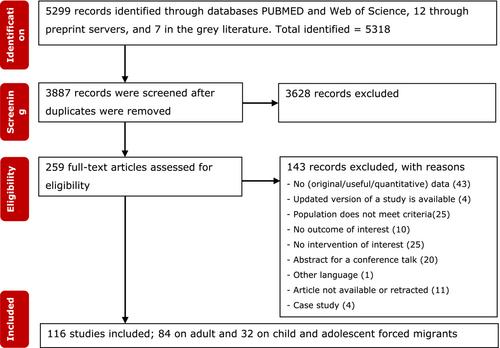Psychological Interventions for PTSD, Depression, and Anxiety in Child, Adolescent and Adult Forced Migrants: A Systematic Review and Frequentist and Bayesian Meta-Analyses
Abstract
Objective
The number of forced migrants has been rising for years. Many forced migrants suffer from post-traumatic stress disorder (PTSD), depression, and/or anxiety and need treatment. Here, we evaluate the effectiveness of psychological interventions (CBT, EMDR, expressive/art, mindfulness, mixed elements, NET and psychoeducation) in reducing symptoms of PTSD, depression, and anxiety in forced migrants.
Design and Data Sources
Systematic searches in PubMed and Web of Science and searches of preprint servers and grey literature were performed (final search date: 1 September 2023). Random-effects frequentist and Bayesian meta-analyses were used for data synthesis.
Results
We included 84 studies on treatment effects in adults (pooled N = 6302) and 32 on children and adolescents (pooled N = 1097). Our data show a reduction in symptoms of PTSD, depression and anxiety symptoms in both adults and child/adolescent forced migrants. Pooled pre- to post-treatment effects (effect size Cohen's d) ranged from −1.03 to −0.26 for PTSD, from −0.91 to −0.11 for depression and from −0.91 to −0.60 for anxiety, without there being differences in outcome per study design (i.e., RCT comparison vs. non-RCT comparison vs. single arm treatment study). Treatment effects remained evident over follow-up, and not a single type of treatment stood out as being superior to other treatment types. Structural differences in populations (e.g., regarding country of origin) over studies, however, could have hampered the validity of the comparisons between study characteristics such as treatment type.
Conclusion
Our findings support the effectiveness of psychological treatment in adult and child/adolescent forced migrants.


 求助内容:
求助内容: 应助结果提醒方式:
应助结果提醒方式:


